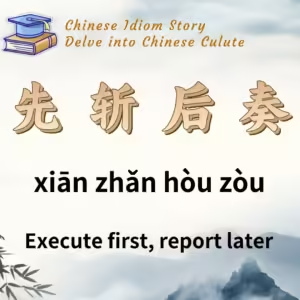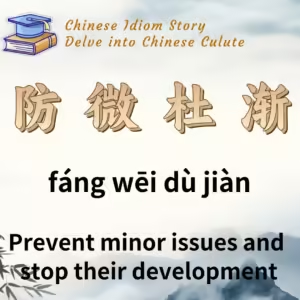
Chinese Idiom: 先斩后奏 (Xian Zhan Hou Zou)
English Translation: Execute first, report later.
pīn yīn: xiān zhǎn hòu zòu
Idiom Meaning: This idiom refers to situations where a person takes action without prior approval or consultation, creating a fait accompli, and then reports the actions to superiors afterward. “斩” (zhan) means to execute (in the context of capital punishment), while “奏” (zou) refers to formally reporting or presenting something to a superior, particularly in ancient China.
Historical Source: “Book of the Later Han” (《后汉书·酷吏传》)
Idiom Story:
During the Eastern Han Dynasty, societal issues were rampant, including corrupt officials and local tyrants. Due to the vast territories and poor communication, local officials often struggled to keep their superiors informed about regional affairs. Consequently, many officials adopted a practice where they would make unilateral decisions, sometimes even imposing severe punishments without prior consultation, resulting in a situation where they acted first and reported later.
One notable instance occurred during the reign of Emperor Guangwu (Liu Xiu) when Dong Xuan served as the magistrate of Luoyang. The sister of Emperor Guangwu, Princess Huyang, had a slave who committed murder and evaded capture. Seizing an opportunity when the princess was away, Dong Xuan took it upon himself to apprehend the murderer and executed him on the spot.
Upon learning of the execution, Princess Huyang was outraged and immediately reported the incident to Emperor Guangwu. Liu Xiu confronted Dong Xuan, demanding to know why he had executed someone without first consulting him, which could have led to a death sentence for Dong Xuan. However, Dong Xuan defended his actions, arguing that decisive measures were necessary in the face of such lawlessness. Ultimately, Emperor Guangwu chose not to pursue the matter further.
From this account, the idiom “先斩后奏” emerged, highlighting the audacity of taking action before seeking permission and the potential consequences that follow such unilateral decisions.






